RxSpark understands that you will want to stay informed with reliable facts during the ongoing coronavirus emergency. We have brought together key information and the latest advice from official sources to help you and your family stay safe during this difficult time.
The information below is accurate as of 26th March, but please be aware that new information is becoming available on a daily basis, and official advice is updated regularly. We will aim to keep our articles up-to-date with the changing situation.
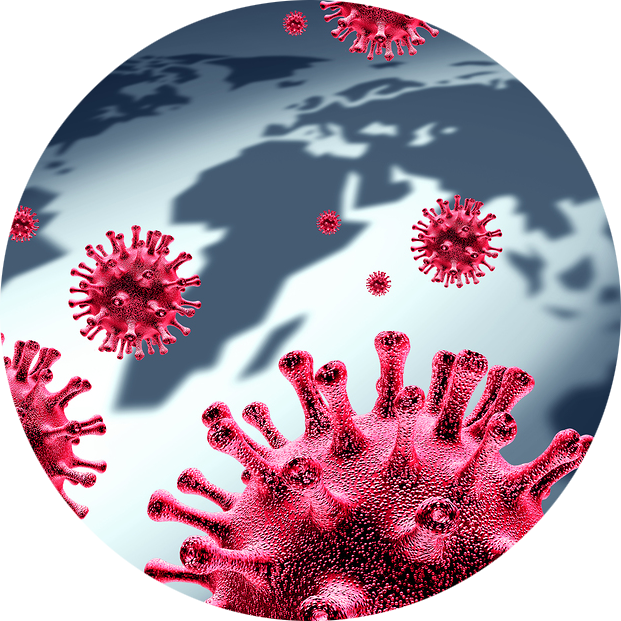 What is COVID-19?
What is COVID-19?
Coronavirus disease 2019, also known as COVID-19, is the name given to the infectious respiratory disease associated with the Severe Acute Respiratory Syndrome Coronavirus-2 (SARS-CoV-2) virus.
In the majority of cases, it causes mild to moderate symptoms and most people recover without requiring special treatment. Certain groups are considered to be at a higher risk and may develop more serious symptoms. These include older people, those with suppressed immune systems, and individuals with underlying medical problems.
It is primarily transmitted through droplets of saliva, or via nasal discharge when someone with the virus sneezes or coughs.
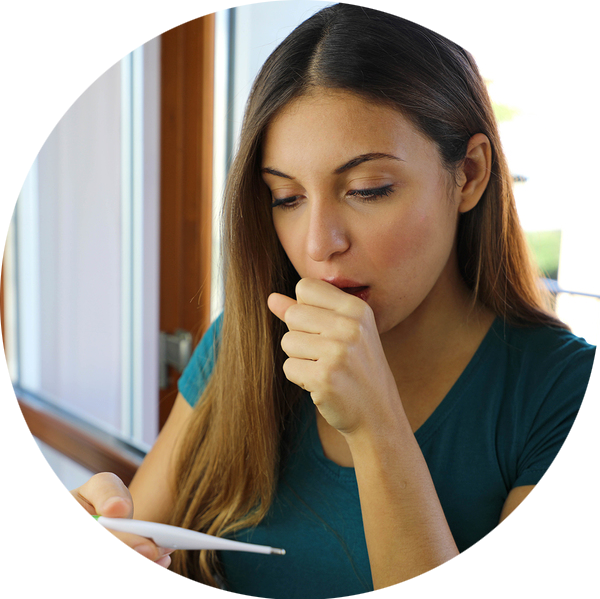 What are the symptoms?
What are the symptoms?
Symptoms of COVID-19 generally appear within two to 14 days after exposure to the virus. They range from mild to moderate, to more severe, potentially life-threatening symptoms. This is particularly true among those who fall into the high risk category. See below for details about who is considered "high risk".
Common symptoms: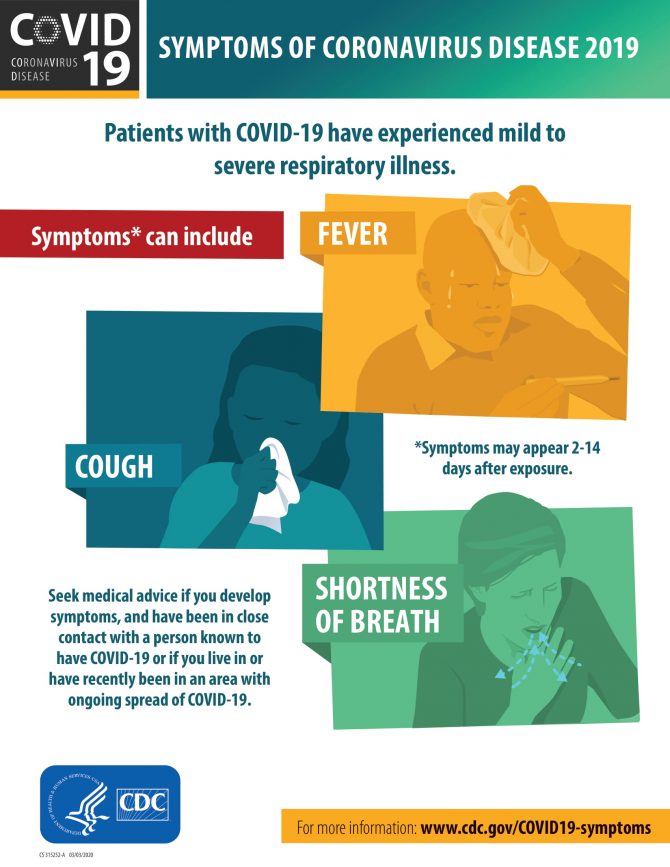
- fever
- fatigue
- dry cough
Other symptoms include:
- shortness of breath
- aches and pains
- sore throat
- a runny nose
- and, in rare cases, some people have reported diarrhoea or nausea
Who is at higher risk from COVID-19?
- People over 65 years of age
- People living in nursing homes or long-term care facilities
- People with severe underlying medical conditions. These include (but are not limited to):
- heart or lung disease
- chronic respiratory conditions, such as COPD or moderate to severe asthma
- diabetes
- cancer
- people who are immunocompromised, e.g. those with immune deficiencies, poorly controlled HIV or AIDS, or who have recently undergone bone marrow or organ transplants
- patients undergoing treatments that suppress the immune system e.g. cancer treatments or long-term treatment using corticosteroids
- severe obesity (people with a body mass index of 40 or above)
The CDC recommends that pregnant women are monitored due to their increased risk from severe viral illnesses, but notes that current data and research does not shown they are at increased risk from COVID-19.
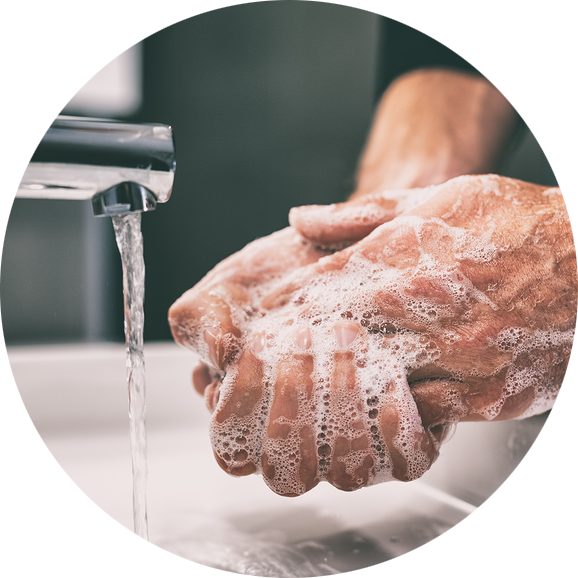 How do I protect myself from COVID-19 and help slow the spread of the virus?
How do I protect myself from COVID-19 and help slow the spread of the virus?
The best way to prevent illness is to take measures to minimize or ideally avoid any exposure to the virus. It is primarily spread from person-to-person, mainly between people in close contact (about 6 feet), or through droplets produced when someone with the virus coughs or sneezes.
Wash your hands, properly and often
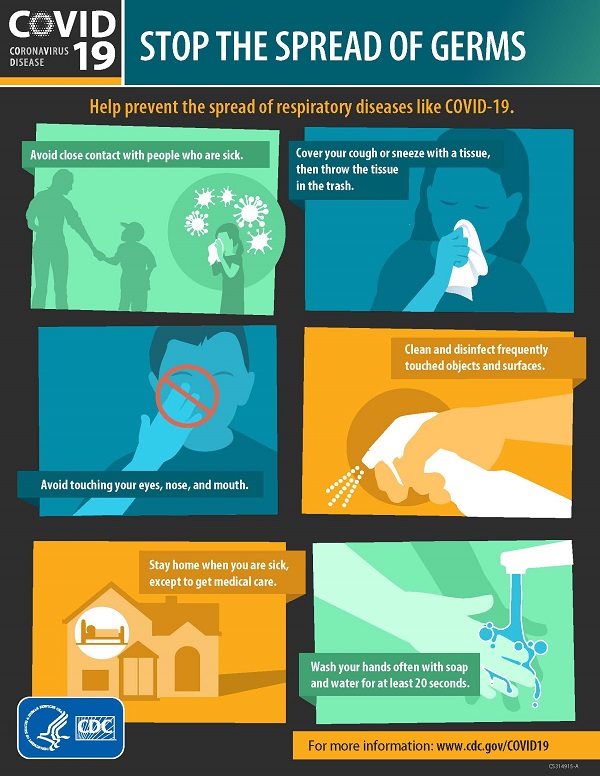
- Use soap and water and wash thoroughly for at least 20 seconds. This is particularly important after visiting a public place or after you blow your nose, cough or sneeze.
- When this is not possible, use a hand sanitizer. Make sure it is at least 60% alcohol.
- Avoid touching your face with unwashed hands.
For guidance on when and how to wash your hands click here or watch this video.
Keep your home clean
- Clean and disinfect surfaces that are regularly touched, such as doorknobs, tables, light switches, countertops, phones, keyboards, toilets, faucets, and sinks.
- Use an appropriate disinfectant:
- Diluted household bleach
- Alcohol solutions (at least 70% alcohol)
- Other EPA-registered household disinfectants
For more information on cleaning and disinfecting, click here.
Cover your mouth and nose when coughing or sneezing
- Use a tissue to cover your mouth and nose when you cough or sneeze.
- If you don't have a tissue, use the inside of your elbow, not your hands.
- Immediately throw used tissues in the trash
- Immediately wash your hands following the guidance above
Social distancing
- Avoid contact with people who are sick
- If you must go out in public, maintain a safe distance (at least 6 feet) between yourself and others
- Stay at home if you are sick, unless you need medical care. (See section below)
- Wear a facemask if you are sick or are caring for someone who is unwell
For more information on social distancing, click here.
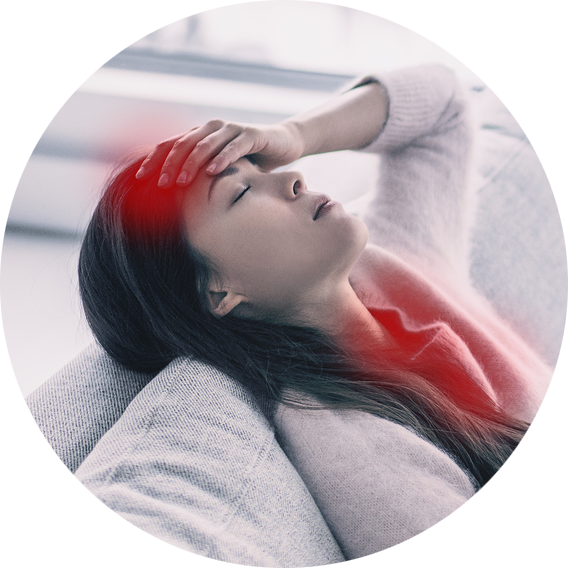 What should I do if I think I have COVID-19?
What should I do if I think I have COVID-19?
What should I do if I develop symptoms?
Most people who are otherwise healthy, but develop mild symptoms, will be able to recover at home without seeking medical attention. Consequently, the CDC guidelines are for these people to:
- Stay at home, unless going to get medical care.
- Avoid public places and public transportation
- Isolate from others - If you live with other people, try to stay in a designated "sick room" and use a separate bathroom if possible.
- Monitor your symptoms and keep in contact with your physician. Call your doctor before you go for medical care and ensure you DO seek medical help if you develop any of the emergency warning signs or believe it to be a medical emergency (see below for details of the emergency warning signs).
- Check your state health department for guidance. State departments and local health authorities may issue their own guidance. They may also have instructions for checking symptoms and reporting information. Click here to check your state's health department.
When should I seek medical attention?
The CDC recommends that anyone who develops the symptoms below get medical attention immediately. These emergency warning signs are:
- trouble breathing
- a persistent pain or pressure in the chest
- new confusion or an inability to arouse
- bluish lips or face
The CDC notes that this list is not all inclusive. If you develop any other severe or concerning symptoms, you are advised to consult your medical provider.
I think I have COVID-19, should I still call 911?
If you have symptoms of the coronavirus and start to develop any of the emergency warning signs listed above (or if have another medical emergency) then you should still call 911. In these circumstances:
- Tell the operator you think you may have COVID-19
- Put on a facemask (if you have one) before medical help arrives. If you don't have one, you can improvise a facemask with a scarf or bandana.
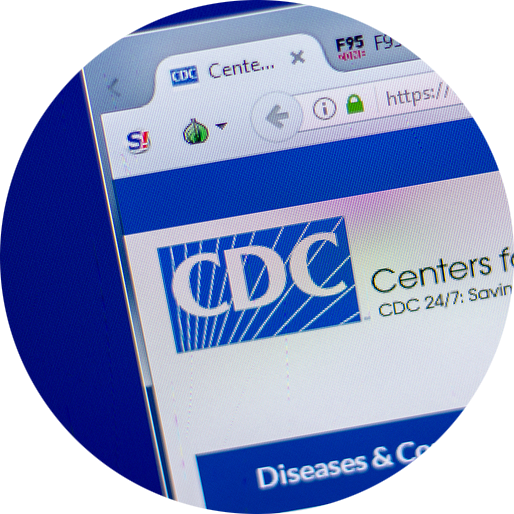 Treatment and Testing for COVID-19
Treatment and Testing for COVID-19
Do I need to be tested for coronavirus?
The latest CDC guidance (March 24th, 2020) issued to clinicians outlines the priorities for testing. This may change depending on testing capacity and may vary depending on your state's health department. If you are otherwise healthy, do not fall into the high-risk category and have only mild symptoms, you may not need testing for COVID-19. If you are unsure if you should be tested, seek medical advice.
Click here to check for updates to the CDC criteria, or visit your state health department's website.
Priority 1
- Patients in hospital
- Healthcare workers showing symptoms
Priority 2
- Patients aged 65 years and older who develop symptoms
- Patients with underlying health conditions who develop symptoms
- Patients with symptoms who are in long-term care facilities
- First responders with symptoms
Priority 3
- Critical infrastructure workers with symptoms
- People with symptoms who do not fall into the two categories above
- Healthcare workers and first responders
- Individuals in communities with high numbers of coronavirus hospitalisations who exhibit mild symptoms
Non-Priority
- Anyone without symptoms
Is there a vaccine for COVID-19?
Currently, there is no vaccine for COVID-19 but around 35 companies and organizations are working on it. Boston-based biotech firm Moderna Therapeutics has shipped the first batches of its COVID-19 vaccine and is expected to start human trials in April.
Is there a cure for COVID-19?
To date, there are no US Food and Drug Administration (FDA) approved drugs specifically for treatment of COVID-19. Treatment involves taking measures to prevent further infection and spread of the disease, and providing supportive care when required, for example, providing oxygen or putting patients on ventilators.
Clinical trials investigating the effect of numerous other medications on the coronavirus are underway across the world. Hydroxychloroquine and chloroquine, medications used to treat malaria and certain inflammatory conditions, such as rheumatoid arthritis, are among those being tested, but to date there are no FDA-approved medications to treat COVID-19.
I found a treatment or test for COVID-19 online. Will it work?
Currently, there is no home testing kit for COVID-19 available. This week (March 24th, 2020), the FDA warned Americans to be wary of fraudulent products claiming to cure, treat, test for, or prevent COVID-19.
If you have questions about the treatments or tests found online, the FDA recommends that you contact your healthcare provider or doctor, while your pharmacist or the FDA will be able to answer questions about medication.
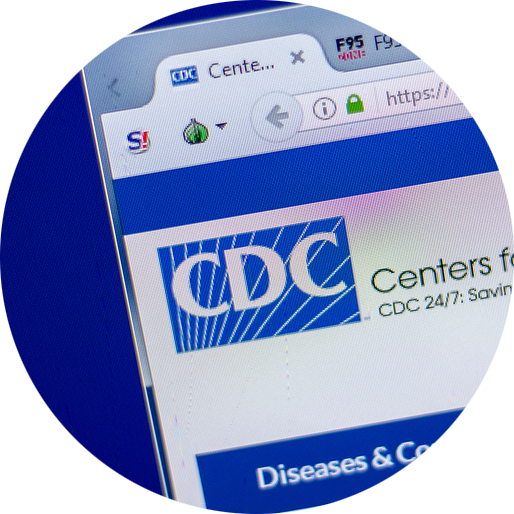 Where do I get accurate, up-to-date information on the pandemic?
Where do I get accurate, up-to-date information on the pandemic?
Below is a list of official sources and links to help you keep up to date with the latest guidance and information on the coronavirus. We will continue to update our website with new and useful content to help you through this pandemic.
Coronavirus Disease 2019 (COVID-19) | CDC
Government Response to Coronavirus, COVID-19 | USAGov
Coronavirus Rumor Control | FEMA.gov
Coronavirus Disease 2019 (COVID-19) | FDA